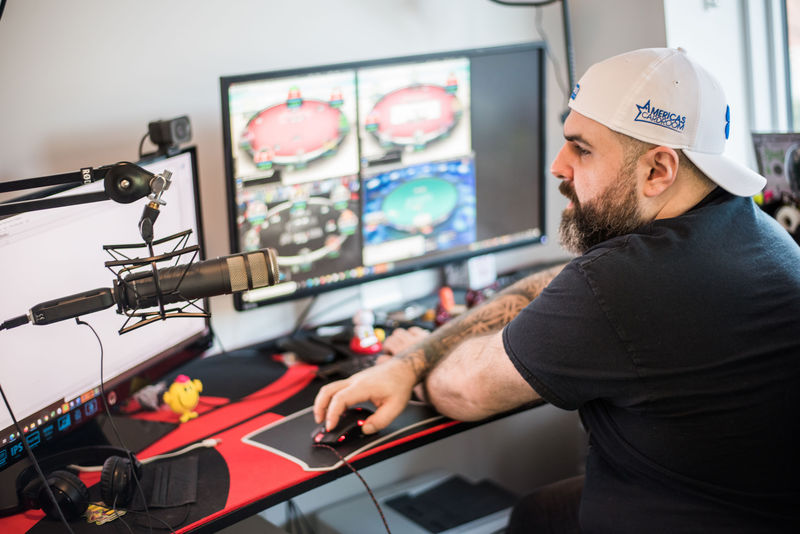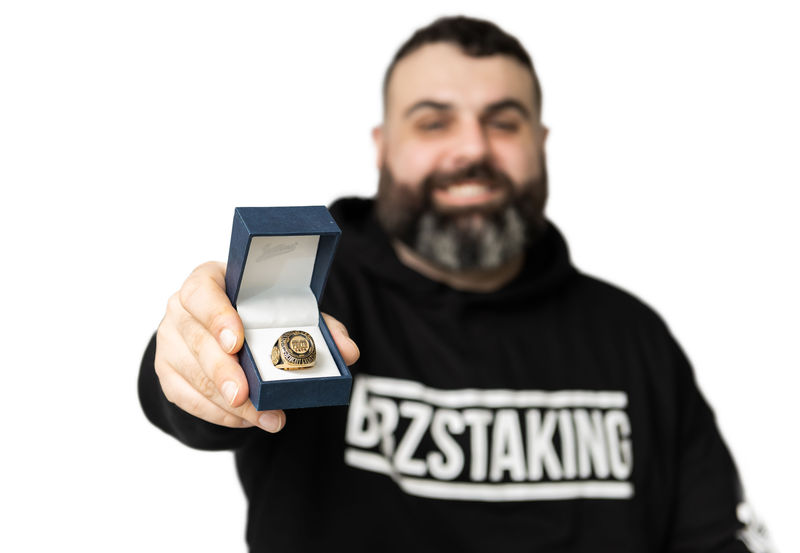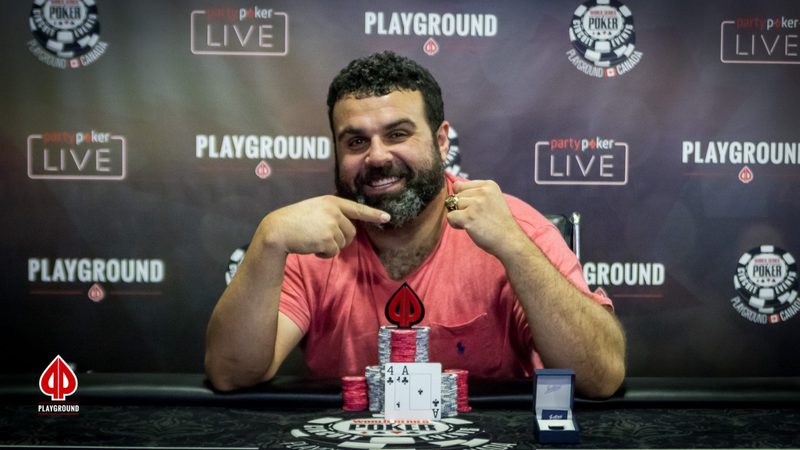






Jonathan ‘apestyles’ Van Fleet Climbs To No. 3 On Online Poker’s All-Time Tournament Earnings ListAmerican Pro Proves To Be A Dominant Force In Online High Roller Sceneby Julio Rodriguez | Published: Feb 24, 2021 |
|
|
 Jonathan “apestyles” Van Fleet was one of the original online stars to emerge from the poker boom, but for years that followed, the New York-born and Texas-raised pro was his own worst enemy.
Jonathan “apestyles” Van Fleet was one of the original online stars to emerge from the poker boom, but for years that followed, the New York-born and Texas-raised pro was his own worst enemy.
Van Fleet caught the poker bug early on in college, and by the time he had graduated from Texas Tech University he had put together a sizable bankroll online. Unfortunately, it wasn’t the only time he’d have to build a bankroll from scratch.
While poker had served as a great initial distraction after his first trip to rehab, and helped him get through school, his alcohol dependence kept sabotaging his would-be surging poker career by punting off more than a few of his online poker accounts.
Always a consistent winner on the virtual felt, Van Fleet took things to a higher level after finding his sobriety. The former chess standout has always preferred online tournaments over live play, and after Black Friday moved to Vancouver to continue his online career.
In 2017, he won the partypoker Millions Online $5,000 buy-in main event for $1,027,000, the largest score of his career to date. With more “ammo” to play with, and surging confidence, Van Fleet began targeting the online high roller events.
The GGPoker Blade $25,000 buy-in tournament was particularly great for his poker résumé. In fact, during a four-week stretch in October of 2019, Van Fleet managed to final table the event 19 times, scoring five third-place finishes, three runner-up finishes, and six wins overall for more than $4 million.
As a result of Van Fleet’s high roller surge in recent years, the 39-year-old now has $16.9 million in total recorded online tournament cashes, according to PocketFives.com. That’s good enough for no. 3 all-time among known players, behind just Sweden’s Niklas “lena900” Astedt and Hungary’s Peter “Belabacsi” Traply.
Van Fleet recently appeared on Card Player’s Poker Stories podcast to discuss the ups and downs of his career, his approach to playing high rollers, and how he feels about the future of online poker. Highlights of the interview appear below. You can listen to the full episode below, or find it on Apple Podcasts, Stitcher, Spotify, or any podcast app.
Card Player: I guess you could say one of your first real bluffs was buying beer at age of 14.
Jonathan Van Fleet: The trick was to go in and try to make a joke. If they laugh, they’re not going to ID you because they’ve already shown that, you know, you started the friendship. They don’t want to be a dick.
CP: Your first trip to rehab was at age 19, right before you started at Texas Tech. Without drinking on the weekends, I’m assuming it was poker that filled your time?
JVF: We played ‘fun’ poker on the weekends. People think now, they’re a bunch of addicts gambling together, which was probably not the best idea. But, you know, it was pretty harmless five-dollar games. I wasn’t actually good [at first.] I was missing my turn. My bluffs were really obvious. My friends kind of made fun of me a lot. But because I had a background in chess, I just decided I was going to get really good at it.

CP: You went from wanting to become a professional deejay, to studying to become a professor, to pivoting to a career as an online poker player.
JVF: My whole life, I’ve always known that I wasn’t going to be satisfied with a nine-to-five job. I do have to say that poker was not great for my grades. I may or may not have been playing on the school Wi-Fi in the back of class.
I was just so sucked into to the game that hours could pass without me really noticing. I’ve been pretty open about having issues with drugs and alcohol, and [my] addictive personality, and what I believe that also comes with is this borderline obsessive energy that can really zoom in on things. It can be positive, and if you put it towards your work, you can accomplish great things. However, I don’t think it’s good for mental health. For my first probably five, ten years of poker, I was just super obsessed. When I was out with friends, in my head, all I really wanted to do was play poker. It was just on my mind all the time.
CP: Despite locking in on poker, you still managed to graduate, with honors, and you did so with a healthy bankroll. But I also heard that you blew up that bankroll on more than a few occasions.
JVF: It doesn’t make logical sense to a lot of poker players who are driven by making the most profitable decision. It doesn’t make sense the way I’ve punted my roll a few times and had these crazy blowups. I’ve done it four times where I’ve blown between $50,000 and $100,000 of my own money in a matter of a couple days.
One time I got blackout drunk. The next day, I checked and I had zero dollars in my Full Tilt account. I remember I had gone to bed with $80,000, or so I thought. I [figured] I had been hacked. So I checked PokerTracker, just make sure. And I look and [it turns out], I had played Sauce123 (Ben Sulsky). [Looking at the hand histories], I had called off $40,000 with bottom pair in one of the pots.
I quit drinking for a while after that one. I definitely had a lot of experiences like that. And then this last time that I went to treatment seven years ago… just never again. I just really don’t want to go through that ever again. I haven’t touched alcohol or drugs since.
CP: You have had some success in live tournaments, including a WSOP Circuit win at the Playground Poker Club in the summer of 2019, but you’ve chosen to focus primarily on online poker throughout your career.
 JVF: I’ve always preferred online. I like playing from the comfort of my home. My traits are the ability to hyper focus and do quick math, so online poker is especially good for me. Also, I would say that my peak performance profile is usually working on my own, so when I’m playing live, I definitely get distracted and make more mistakes. I feel like I’ve gotten a lot better at my live game, but I’ve put in probably 97, 98 percent of my time online.
JVF: I’ve always preferred online. I like playing from the comfort of my home. My traits are the ability to hyper focus and do quick math, so online poker is especially good for me. Also, I would say that my peak performance profile is usually working on my own, so when I’m playing live, I definitely get distracted and make more mistakes. I feel like I’ve gotten a lot better at my live game, but I’ve put in probably 97, 98 percent of my time online.
I’m pretty facially expressive. So, when I play live, I have to shut up and keep my hands over my face if I want to play well. Because if I start talking, then I get distracted and don’t see the action. And then sometimes I make a connection with someone and we’re really getting along. I’m still going to play my best poker, but it’s not as fun to beat them, you know?
CP: What are the main differences between the winners of the first online poker boom and the winners today?
JVF: I would say in the beginning that those who were doing the best when there wasn’t that much information out there, were probably just the [cleverest] people. And luckily, I got to be friends with those people and learn a lot from them. And then, I would say that the main change was when the solvers all started coming out.
CP: You were an early adopter of the solvers, and started a study group with fellow high-stakes players Stephen Chidwick and Elio Fox.
JVF: You [could] start getting objective answers to all your questions. At that point, things shifted to where you couldn’t get by with just your intuition anymore, because you’re not going to beat somebody that’s really, really studied the solvers.
So now, I actually think that we are in more of a meritocracy in poker, meaning that those who work the hardest, are going to be the ones who come up. I mean, of course, there’s still a lot of luck involved, but there is a reward for studying hard.
CP: Speaking of luck, how has variance affected your results, given the high volume that online players put in.
JVF: I did a lot of winning between 2013 and 2016. Like my account was blessed or something. I just crushed everything. And then after 2016, I had a losing year even though I was still studying and still working on my mental game. It was frustrating because I knew I was trying hard. I was listening to motivational speakers before I played, and meditating, and I just realized that I was running bad. It was just 2,000 tournaments. And, of course, there was stuff I could fix. Always. But I realized that the losing streak was mostly due to [bad] luck.
 Then in 2017, I started off winning the Million on partypoker for $200,000. And then I got fifth in a $25,000 [event] for another $200,000. And then after that, I won $1 million in the partypoker Millions Online. That was pretty big. That was definitely career changing.
Then in 2017, I started off winning the Million on partypoker for $200,000. And then I got fifth in a $25,000 [event] for another $200,000. And then after that, I won $1 million in the partypoker Millions Online. That was pretty big. That was definitely career changing.
CP: What was it like to win a million dollars in an online tournament?
JVF: Mostly I just thought, ‘Wow, this is amazing!’ But there is also this fear because I had burned down money before, you know? That’s a lot to burn down. So, I didn’t touch it. I didn’t do anything for a couple of months.
CP: Many successful players have said that you need to have a healthy disregard for money to play high stakes.
JVF: That is sort of my perspective when it comes to poker and the money. It’s like, oooh…. ammo!
I just fire whatever’s the biggest. When they were running non-stop $25,000 events that you could re-enter, I had a day where I think I lost like $400,000. Now, that was mostly not my money, but it still felt crazy.
I do think that to play the high stakes, you have to have some kind of a strange relationship with money. That being said, I think the optimal way is to play good games, don’t stress about losing, but also live within your means. Like if you made $100,000 this year in poker, act as if you’ve made $40,000, because you can’t guarantee that next year.
I don’t even know how I trained myself to be like that. I’ll briefly get upset or happy over something, but I really try not to focus on the results and just try to focus on the decisions. If the decisions are bad, I get upset. If the decisions are good, I don’t really care.
CP: Are you superstitious at all?
JVF: Yes. Not when I play poker so much, but like in general, I am superstitious only because I think it’s more fun. Like at 11:11, I hold my breath until 11:12 and make a wish. I’ve been doing that since I was a little kid. I like to do little things like that, but I don’t put that much stock into them. And I would never make like a real poker decision based on superstition.
CP: Being an online pro, you get to have more anonymity than some of the more recognizable faces on the high roller circuit. Do you like to tell people that you are a professional poker player?
JVF: For certain people, especially people who are in recovery, it’s not a good idea for me to promote what I do, in my opinion. Because there are a lot of pitfalls for people who are in addiction, and it’s kind of an anomaly that I made it out. So, I have a pretty big boundary with people who are in recovery. I’m not going to teach anything, and we’re not going to talk about it. I fell into every hole that you can and somehow managed to pull myself out with the help of friends and family and really come out on top. But I think that for every story like mine, there’s a guy who probably pawned all his shit, you know? So, I definitely don’t want to promote that unless I really could see that they have a good mind for poker. But that’s pretty rare.
CP: You’ve been living in Canada since Black Friday so you can continue playing online poker. Do you hope to one day be able move back to the States?
 JVF: I’ve got a lot of friends now in Vancouver. I love this city. I like the people. It’s really chill here. It’s also really expensive, and the weather is a bit tough. It definitely has been on my mind to go back to the States and go somewhere where the housing is fairly inexpensive, where I can get more bang for my buck. I was thinking Detroit, or North Carolina. I’ve seen some really, really cool places out there. But the requirement is that I can play my poker.
JVF: I’ve got a lot of friends now in Vancouver. I love this city. I like the people. It’s really chill here. It’s also really expensive, and the weather is a bit tough. It definitely has been on my mind to go back to the States and go somewhere where the housing is fairly inexpensive, where I can get more bang for my buck. I was thinking Detroit, or North Carolina. I’ve seen some really, really cool places out there. But the requirement is that I can play my poker.
CP: What are your thoughts on the current state of online poker?
JVF: I now have a good amount of faith in the game, because the game has held up. Everyone’s been the naysayer for such a long time, but we’re still going, and I think it’s going to keep going strong. I really hope we get the Asian markets involved more, and legislation in the States may change things. Online poker is pretty healthy right now. I don’t love how all the sites run things exactly, but the player pools are still quite good and there’s lots of cool tournaments to play. So, I think online poker is kind of looking up.
Follow Jonathan Van Fleet on Twitter @apestyles, and watch him stream his high-stakes online play on Twitch at apestylespoker. You can also get his poker training bundle at BBZ Poker. ♠

Features
The Inside Straight
Strategies & Analysis